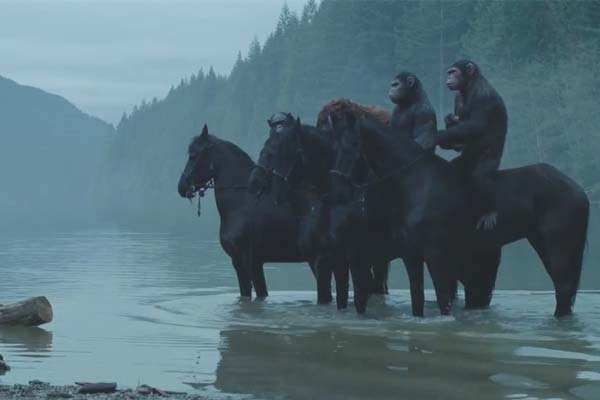2011's surprising 'Rise of the Planet of the Apes' was an impressive showcase of how a fairly simple, modern science fiction story could be propelled to compelling new heights thanks to an emotional and industry-changing motion capture performance by Andy Serkis.
The film wasn't perfect. The human characters were fairly one dimensional and the script had its issues, but the project was moving and clever enough to more than justify its existence as a reboot.
It doesn't happen a lot, but it felt like one of those rare times that a Hollywood studio cared more about making a smart blockbuster than cheaply cashing in on a pre-established brand.
The sequel, 'Dawn of the Planet of the Apes' not only launches itself from the strong groundwork laid down by the original, but it improves on almost every facet that came before it to deliver a weighty and intelligent blockbuster that is everything that Michael Bay's 'Transformers' franchise is not.
Set 10 years after the first outbreak of the simian flu, mankind has all but been completely eradicated from existence. Only those few who are immune to the virus are left to survive on a dystopic and floundering version of earth.

Caesar (reprised by Serkis) continues in his role as the sympathetic and commanding leader of the apes. Found deep in the Californian forestry, the apes are united as one 'family' under Caesar's fair and just rule and moral code. Human beings have not been seen in quite some time. That is until a group, led by Malcolm (Jason Clarke) stumble across two younger primates on their way back from hunting.
This unexpected discovery quickly escalates fear and tension between both sides and forces Caesar to firmly establish the boundaries between the ape's domain and that of the humans. By showing both his strength and mercy, Caesar hopes that his actions can avoid further bloodshed and an eventual war.
Incoming director Matt Reeves (Cloverfield, Let Me In) and writers Mark Bomback, Rick Jaffa and Amanda Silver do an outstanding job at blurring the lines of 'humanity' between the simians and Homo sapiens. In each faction there is the overwhelming primal need for protecting and assuring the survival of their own species. Much of the film's intriguing drama spills from the misunderstandings and misconceptions between the individuals within those factions. The creative team have clearly spent considerable time ensuring that none of the film's antagonists are twisted caricatures of unnecessary evil. Both 'villains', Koba (motion captured and voiced by Toby Kebbel) and Dreyfuss (Gary Oldman), have intentions and motivations that make them vulnerable, empathetic and justified in their thinking.
Just as it was in 2011, the film's most valuable players are once again the stunning and photo-realistic work from Weta Digital, and the masterful performances by all the motion-capture artists. The amount of compelling drama that is derived solely from the ape's facial expressions, sign language and broken dialogue is a testament to how seamless and breathtaking the visual effects work here is. It's that flawless. Peter Jackson should be so proud.
The drama is assured and given plenty of time to allow events and the consequences of actions to flow naturally. Some may argue that this affects the pace and flow of the production, but the mirroring and clashing between both parties felt unforced and entirely necessary in providing significance and depth to the action that was to follow. When the conflict finally reaches its boiling point it's rather brutal and hard to enjoy. There is arresting visual spectacle but it comes at a cost.
Sure, there is the guilty pleasure of watching Koba armed with two machine guns riding through flames on horseback, but apart from that moment, the violence is not celebratory. It's profoundly bleak and anti-war. It echoes loudly that both sides aren't all that different and this bloody and unnecessary chaos and destruction could and should have been avoided.
'Dawn of the Planet of Apes' is another well-earned notch on director Reeves' impressive belt, and in his hands, the franchise has some much needed gravitas that truly elevate the material far above your typical blockbuster.
The summer of 2014 firmly belongs to 20th Century Fox. With last month's 'X-Men: Days of Future Past' and now 'Dawn', the studio has done much to prove that action-packed blockbusters are far more effective and exhilarating when they're served alongside intelligent, character-driven, and emotionally complex drama.
4.5/5
written by Shayne Travis Grieve

